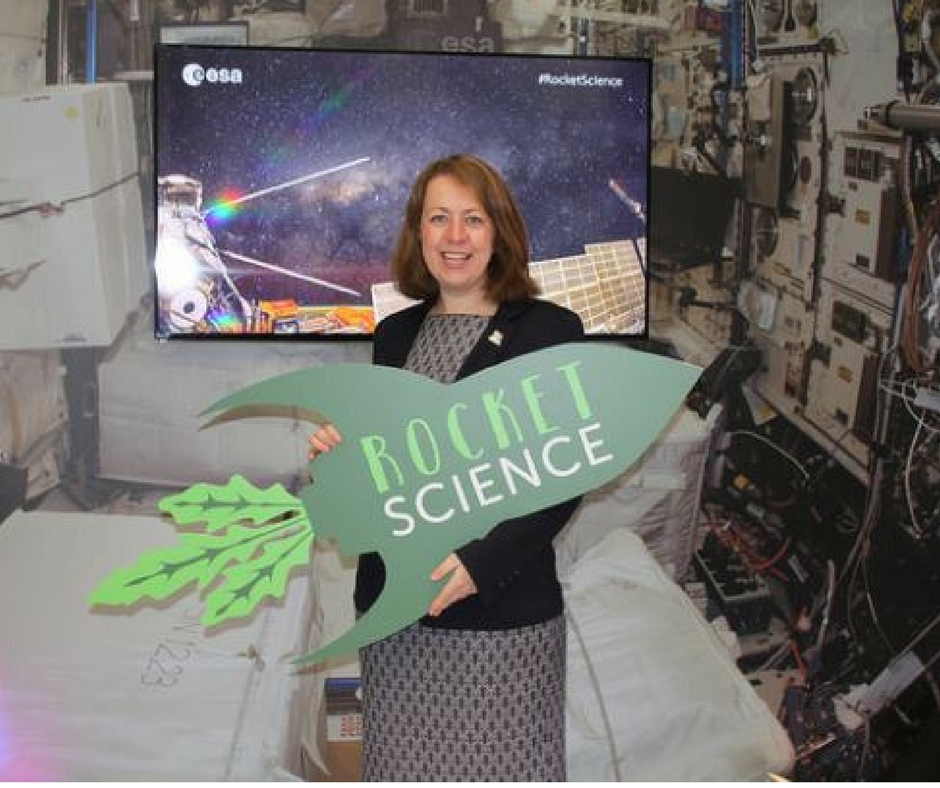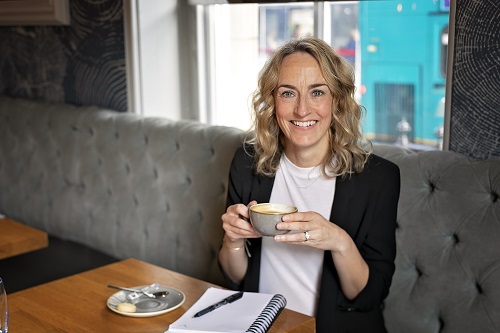 Interview with Libby Jackson, Head of Human Spaceflight at the UK Space Agency.
Interview with Libby Jackson, Head of Human Spaceflight at the UK Space Agency.
What Has Been Your Career Highlight?
2 years ago today (15th Dec, 17), when Tim (Tim Peake) went into space. The UK Space Agency had put on 4 national launch events and I was at the Science Museum which was filled with 3000-4000 school children, all watching Tim launch. I was standing on the balcony watching Tim go and the kids raised the roof. It was spine tingling.
All these things that I had worked hard towards for all these years, it had all come together on that day. I was standing in the middle of it, right at the centre of the team that was making everything happen.
Later that day, as Tim was docking, I was there standing next to Helen Sharman. We were on camera explaining what was going on and I suddenly thought, ‘the first British astronaut is next to me, Tim Peake is going into space and I’m standing here, answering questions and people are listening to what I have to say’. How on Earth did I find myself here!
What’s Your Current Role?
I work for the UK Space Agency and I manage Human Spaceflight and Microgravity – which is not something I ever thought would be possible for me to end up doing. I liaise with the science community in the UK who do research on the space station or on many of the analogues (facilities) that we have here on Earth – drop towers, parabolic flights, isolation studies down in the Antarctic. These facilities allow us to recreate some of the conditions in space, – like short periods of microgravity or isolation. I look after strategy, policy and help the scientists to find funding.
I’ve been working in human spaceflight for over a decade now.
Is Human Spaceflight Something You’ve Always Wanted To Work In?
It was always something I was interested in when I was growing up. I devoured all stories about space especially the ones on the moon landings.
At school, in year 9, my teacher waved a yellow piece of paper around and asked if anyone was interested in going to space school. I put my hand up! I ended up going for a week on a residential course at Brunel University and it was there that I found out that we built satellites etc in the UK and was hooked even more!
In 6th form, we had to arrange a work shadowing placement. I said I wanted to work with NASA one day and decided to email them. Of course, I didn’t think anything would happen, but they wrote back, and I spent 2 weeks at the Johnson Space Center in Houston, seeing everything, meeting all the scientists.
That Must Have Been Pretty Amazing!
Yes! The thing that stuck with me was the first time I sat in Mission Control. They were doing launch and abort simulations for the shuttle and I just loved it.
I was 17 and came back from that trip and knew this was what I wanted to do but didn’t think it would happen. The UK just didn’t support human spaceflight. At that point, I thought the only way I could do it was to maybe fall in love with an American and get a Green Card and move to Houston!
What’s Your Background?
I studied Physics at Imperial College, did a Masters Degree in Space Engineering at Cranfield University and then looked for a job in the UK space industry. I wanted to work in Mission Operations but I didn’t think there would be any such roles in the UK. However, Airbus were putting together a satellite mission control centre and needed Operations people. I ended up working for them for 3 years.
Then I discovered that the International Space Station would soon include a European module scientific lab, called Columbus. The control centre was in Munich and I just knew I wanted to work there. I started applying for jobs, got a job as an instructor and eventually trained as a flight controller.
One day I got a phone call saying, ‘we are looking for a flight director, we think you‘d be perfect’. I got my dream job; the job I had dreamt of when I was 17.
How Did You Get Your Role At The UK Space Agency?
I worked in Munich for 7 years. I reached a point where I wanted to come back home, so I started to look around, I thought about moving into a role within air traffic control.
Then in December 2012, the UK decided to join human spaceflight. In May 2013, Tim’s flight was announced, and I knew I couldn’t leave the space industry.
I flew back to the UK for the UK Space Conference and introduced myself to the UK Space Agency. I explained who I was, that I knew all about human spaceflight and asked if there were any roles with Tim’s mission. Tim himself was the one who suggested I apply for the role to run the education programme.
And You Knew That You Had To Have That Job?
Yes! I waited for it to be advertised, applied for it and went for the interview. I was honest and explained that I probably didn’t have all the skills they were looking for but also that I believed I was the best person for the role. I got the job and moved back to the UK!
I managed Tim Peake’s education programme for 3.5 years and now I manage human spaceflight.
If you’d have said to that 17-year-old, you’re the one who is going to be running this, I would have laughed.
(I mentioned to Libby that my 7-year-old daughter had some questions for her.) One was, Have You Ever Been Into Space?
I’ve never been into space but have worked with astronauts, alongside them, for a long time. I’ve never been but in some ways, I feel I know a little bit what it’s like.
Last week, for the first time ever, I got to feel a bit of what it would be like to go into space as I was fortunate enough to be offered the opportunity to do a parabolic flight (being in microgravity for 20 seconds at a time). You fly along the level (as you would with a normal flight) and the pilots put the engines to full throttle, accelerate and pull upwards, and then basically cut the engines.
You go up and over the top of the parabular for 20 seconds. The plane and everything inside it is subject to the force of gravity. The pilots do some clever stuff with the engines to counter act the drag. You float and are weightless for 20 seconds. It was an amazing experience.
Did Your Parents Completely Encouraged Your Interest in Space?
They have been brilliant and just let me get on with what I wanted to do. They have never told me I couldn’t do anything. When NASA wrote back, they said, ‘well we’d better sort you out with the air fare so you can go’.
They have always been supportive, and I’m sure this is why I’ve followed my dreams like I have.
 Tell Us About Your Book.
Tell Us About Your Book.
It’s called A Galaxy of Her Own. It tells 50 stories of amazing women, their lives and contributions to human spaceflight. People often think of space as a ‘male place’ as all the famous names tend to generally be men. We forget that the first British astronaut was Helen Sharman. It’s really important that everyone understands that space is an arena for everybody. So, it has been wonderful to write this book and celebrate the work of these women.
Who Is Included In Your Book?
It’s not just a book about astronauts. It’s about women from different countries, with different backgrounds, doing many different roles. From doctors to lawyers, technicians to seamstresses – there’s something in there for everyone.
It’s a book that I hope boys, girls, men and women will enjoy, that talks about never leaving sight of your dreams and passions. You won’t know how you are going to get there but if you work hard and stay determined, you take every opportunity that comes your way and you always enjoy what you’re doing, then really anything is possible.
You Sound Like You Are a Confident Person, Is That Right?
I would say I am confident, but I am terrible at not always being proud of myself. When you gave me that compliment, I felt like I wanted to tone it down, make less of it. I sometimes struggle to say, ‘yes I am’.
If someone says you’re looking lovely today, I’ve learned to accept the compliment, and trust they mean what they say, and so say, ‘thank you’. But other times, my instinct is to play it down. I don’t think you get men or boys doing that as much as women. It’s something that we all need to learn – be proud of who you are.
What Would You Tell Your Younger Self?
I think I’d say don’t lose sights of your dreams. My life has surpassed anything I thought possible.
And I’d also tell myself to have more confidence. I was always confident in my academic abilities but I’m less confident in me – how I look, how I come across. Be more confident in who you are, believe in yourself more.

 Tell Us About Your Book.
Tell Us About Your Book. 






